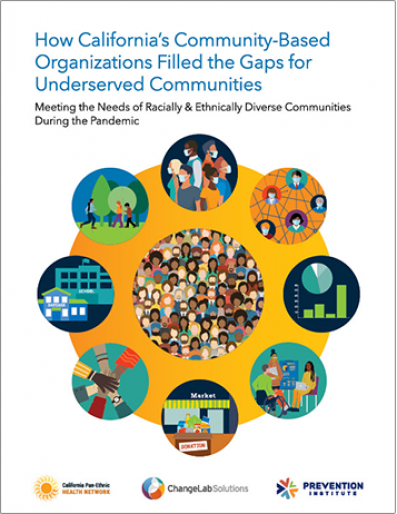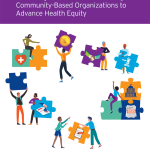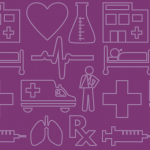How California’s Community-Based Organizations Filled the Gaps for Underserved Communities
Meeting the needs of racially & ethnically diverse communities during the pandemic
Across California, community-based organizations (CBOs) have stepped up to address community needs during the COVID-19 pandemic. While the ongoing crisis continues to affect most Californians, BIPOC communities (Black people, Indigenous people, and other people of color) continue to experience disproportionately negative economic impacts and the highest COVID-19 case rates.
This report — created by ChangeLab Solutions, the California Pan-Ethnic Health Network, and Prevention Institute, with contributions from 21 California CBOs — shows policymakers and community leaders how they can improve California’s efforts to support an equitable recovery from the social, economic, and health effects of the pandemic.
CBOs are indispensable within the wider public infrastructure and should be empowered and funded in accordance with the vital services and supports that they provide.
An equitable recovery is one that prioritizes racially just, community-led solutions to reverse the underlying inequities that have generated disparities in COVID-19 case and death rates. An equitable recovery must give decision-making power to BIPOC communities, to ensure that their needs are adequately addressed. Informed by interviews with CBOs throughout the state about how they pivoted to deliver crucial supports and services to community members, this report offers recommendations for changes in policies and practices that can help governments partner with community organizations to better meet community needs.
Besides documenting efforts toward equitable recovery and providing recommendations, the report reveals that the success of equitable recovery efforts — and efforts to promote health equity more broadly — depend on improved relationship building between government entities, CBOs, and community members. Local governments must make structural changes to ensure that equity considerations are incorporated effectively in all of their policies and services. CBOs are indispensable within the wider public infrastructure and should be empowered and funded in accordance with the vital services and supports that they provide.
For media inquires, see our press release.




